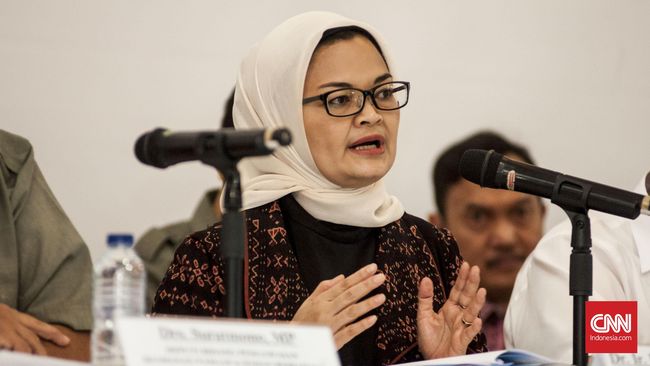Jakarta, CNN Indonesia –
National Agency of Drug and Food Control (BPOM) reveal all research subjects Nusantara vaccines experiencing an Unwanted Event (KTD). Vaccine initiated by the former Minister of Health Terawan Agus Putranto it began to be tested on the volunteers.
The 28 volunteers reported experiencing local pain, muscle pain, joint pain, headache, thickening, redness, itching, petechiae, weakness, nausea, fever, cough, runny nose and itching.
“All subjects experienced adverse events in the vaccine group with adjuvant levels of 500 micograms and more than in the vaccine group with adjuvant levels of 250 micograms and without adjuvants,” said the Head of BPOM Penny K. Lukito through a written statement received. CNNIndonesia.com, Wednesday (14/4).
Penny then detailed, as many as 20 of the 28 subjects or the equivalent of 71.4 percent of volunteers experienced KTD even though they were in grades 1 and 2. In addition, there were grade 3 KTD in 6 subjects with details, namely one subject experienced hypernatremia, the subject experienced an increase in Blood Urea Nitrogen. (BUN) and three subjects had elevated cholesterol.
Penny explained, in the research protocol, grade 3 KTD was actually one of the criteria for terminating clinical trials. However, he said the Nusantara vaccine team did not stop the research even though grade 3 KTD were found.
“Researchers during the inspection conducted by BPOM, did not stop the implementation of clinical trials and analysis carried out by the research team related to the incident,” he explained.
Penny continued, there were 3 out of 28 subjects or about 10.71 percent of subjects who experienced an increase in antibody titres more than four times after four weeks of injection. However, 8 of the 28 subjects had decreased antibody titres after four weeks of injection compared to before injection.
In detail, three subjects who experienced an increase in antibody titers more than four times, 2 subjects were in the vaccine group with an antigen level of 0.33 micograms and an adjuvant 500 micograms, and 1 subject was in the vaccine group with an antigen level of 1.0 micogram and an adjuvant 500 micograms.
With these findings, BPOM has not yet issued the Approval for the Implementation of Clinical Trials (PPUK) for phase II clinical trials of the Nusantara vaccine. BPOM asked the Nusantara vaccine research team to improve and complete the document on Good Manufacturing Practices (CPOB).
Meanwhile, the vaccination program that has been running in Indonesia is also known as the Post-Immunization Follow-up Event (AEFI). As with AEFI in Sinovac, there were local reactions, redness and pain at the injection site, to itching.
While systemic reactions have also been reported such as drowsiness, fever, headaches, to muscle aches. However, Komnas KIPI said the local reaction was reported to be cured within 1-2 days.
President Joko Widodo (Jokowi) when he received the injection of the first dose of Sinovac on (13/1) then also admitted that he had aches after being injected with the vaccine from China. Jokowi felt the achy effect two hours after the injection.
CNNIndonesia.com has contacted the Nusantara Vaccine Researcher from Undip Semarang, Yetty Movieta Nency, but he has not been able to respond to the BPOM statement. Meanwhile, a member of the Nusantara Vaccine Clinical Trial Team, Jajang Edi Prayitno, who was asked for a response, was also reluctant to comment. Jajang asked to contact the Principal Researcher of Nusantara vaccines, Djoko Wibisono.
(khr/pmg)
– .


